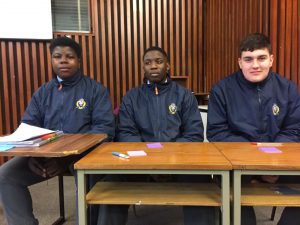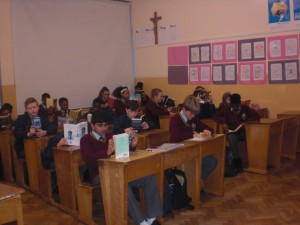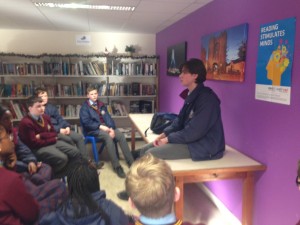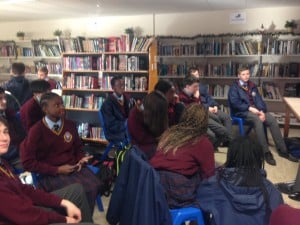Well done to all who took part in the ‘Hamlet’ challenge of 2018. Soliloquies, dramatisations and props to represent the characters and themes – it was a morning of fun activities and revision. Many thanks to Mr Lavin for participating.



Well done to all who took part in the ‘Hamlet’ challenge of 2018. Soliloquies, dramatisations and props to represent the characters and themes – it was a morning of fun activities and revision. Many thanks to Mr Lavin for participating.




Makua and Stephanie from Transition Year did themselves proud at the National Library of Ireland. They entered the Poetry Aloud competition where both students had to recite two poems in front of an audience of students, teachers and a panel of judges. Both girls did the school proud.
Unfortunately they did not progress to the next round but we have no doubt that they will enter again next year and this experience will be a bonus to them.
6th years had the pleasure of a trip into Smock Alley Theatre to see ‘Macbeth’ on 23rd October. The performance was put on by the Gaiety School of Acting and was an enjoyable and education experience.
The first thing to strike us, however, was an apparent return of the ‘curse’ of the Scottish play. Unfortunately, the actor due to play the title role had injured himself and so an understudy had to step in. This actor had his script in hand for the performance but this was soon forgotten by the audience who were immersed in the drama that unfolded before their eyes.
A central element to this production was the addition of music. A diverse range of instruments were used – drums, a violin, an accordian, an electric guitar and even a saw! The music heightened the tension, reflected the pace of different parts of the play and created an eerie atmosphere. Also notable were the times when the music stopped. Some moments of extreme emotion, such as the news that Macduff’s wife and children had been executed and Macbeth’s ‘Out, out brief candle’ speech, were notable for the absence of music.
Another interesting point to note was Martin Maguire’s casting of the same actor to play Lady Macbeth as one of the witches – we felt that this was intentional and highly effective in linking Lady Macbeth with supernatural forces.
The play itself was followed by a workshop where students had the opportunity to give their opinions on the play and to ask questions of some of the actors. Our students did us proud with some excellent contributions.
The day was a wholly enjoyable experience.

5th year students were treated to two debates on Monday morning – Clann Eanna took on Clann Antoine and then Clann Froinsias took on Clann Padraig.
The first debate was on the motion that ‘This house believes that security cameras are a violation of our civil liberties.’ Speaking for Eanna were Jake, John and Chloe. All three speakers were well prepared and gave engaging arguments as to why we should not permit the use of these devices. Speaking for Antoine were Seyifunwa, Charlie and Shope. These three speakers were equally as informative and entertaining in their speeches. Both sides made reference to crime statistics, the use of CCTV in schools and towns, and to fictional texts such as ‘1984’. They made excellent rebuttal points against each other and delivered their speeches with confidence and passion. When the vote was thrown out to the audience, the motion was carried and Clann Eanna were declared the victors.


The second debate was just as lively as Clann Froinsias took on Clann Padraig on the motion that ‘This house believes the internet should be dismantled’. Speaking for Froinsias were Daniel, Conor and Immanuel. They were both entertaining and informative with their arguments. Speaking for Padraig were Mark, Nicolas and Cormac. The audience thoroughly enjoyed listening to speeches about gaming, socialising, cyberbullying and study. The vote from the audience saw the motion being defeated and Clann Padraig were victorious.


Katelyn did an excellent job chairing both debates and she was ably supported by Nicolas as timekeeper.

It was a very enjoyable morning for both speakers and audience and is sure to be repeated later in the year!!
Here is a poem written by Mia Delaney in 1A1 for anti-bullying week last week. Mia read this poem aloud at school assembly.
Anti-Bullying Poem
I don’t know why it started,
It caught me by surprise,
Classmates making fun of me,
Spreading rumours and lies.
At first it was nothing,
Just a few sly remarks,
But then it got worse,
Their words vicious like sharks.
I bottled it up,
I let it consume me.
It made me feel small,
And I didn’t tell my family.
I felt like if I told,
It would make me look weak.
So I continued on,
My life becoming bleak.
My personality shifted,
My grades started to fall.
A numbing pain spreading inside me,
I felt no happiness at all.
But then one day,
I had enough.
Enough of their words,
Hurtful and rough.
I couldn’t deal with it,
I was taking a stand.
This icy pain had to stop,
That was my demand.
So I told my parents,
And instantly felt better.
To my principal
They wrote a letter.
Soon enough
The teasing ceased.
And from my shoulders,
Pressure was released.
I soon became happy,
And found interest again,
In hanging out
With my friends.
No one deserves to go through that,
No, not anyone at all.
So if a friend seems out of sorts
Please just give them a call.
Here is a compilation of five different opening scenes from ‘Macbeth’. Which is the most effective in your opinion?
Here’s a look at how to handle a Keats poetry exam question. You can see a model introduction and then some broad tips on how to plan the essay. A plan is just the bones – some flesh will be added in the next day or two.
LC HL 2009
Keats presents abstract ideas in a style that is clear and direct. Do you agree….
From my study of the poetry of John Keats, I am not surprised that many call him the finest English poet of the Romantic period. In many ways, his work is typical of his era. His themes reflect his deepest beliefs about what was important to him in life. Imagination, nature, strong emotions, love, death, transience, immortality are among the many abstract ideas with which his poetry is concerned. The manner in which Keats writes is often clear and direct as he creates verbal music in his sound effects, sensuous imagery that is tactile and aural. However, there are often times when his style can be challenging such as his use of paradoxes and antithesis to explore his themes. Therefore, I agree with this view of Keats’ work to a large but not full extent.
Now, you can approach this essay in one of two ways:
Go through 4/5 of the six studied poems – one par or two paragraphs for each poem. As you discuss each poem – refer to one or two of the different abstract ideas mentioned in the intro and show how the style is clear / direct or not. If you are discussing one poem in each paragraph, make sure you link to another poem (perhaps the 6th poem, not being assigned its own paragraph) by way of a quote that shows a similar or different view/use of the theme/style being discussed. As always use words that show your personal response eg I was impressed with, I was challenged by, I enjoyed, I have often/never felt the same way about… I was pushed out of my comfort zone when studying… Keats’ use of x is striking… and so on.
Choose a different abstract idea according to the ones listed in the intro for each different paragraph. As you discuss each theme, refer to two or more poems that deal with it. Also show how Keats explores the idea – his style and comment on its clarity and directness (as the question requires). Again, include a personal element. As always keep the focus on the exact terms (or synonyms) of the question.
What is ultimately expected is that you show you know and understand Keats’ poetry thoroughly; and that you have thought about it and formed an opinion that you can justify and defend. Furthermore, you are being tested on how well you can interpret a question and apply your knowledge and understanding and opinion to what the question asks of you. (RTFQ and ATFQ J)
Now for two outlines – one following each approach:
As always have a think about putting your paragraphs in a logical order that will create a flow to your thinking – and try to create smooth transitions between paragraphs.
Intro: (similar to above)
MB 1: Ode to a Nightingale
(Ask yourself: What abstract themes does this poem deal with and are those themes expressed in a clear and direct style?)
Abstract ideas – the imagination, transience, poetry, nature, mortality, death
Style – synaesthesia, sensuous imagery esp smell, allusion, contrast, changing tone
(Now ask yourself: How will I shape these points to suit my paragraph? OR: Which of these points will I use for my paragraph? OR: What will my paragraph topic be in relation to the question asked?)
MB 2: Ode to a Nightingale
Continue with points not used in MB 1.
Contrast this poem’s treatment of nature with its treatment in ‘La Belle Dame Sans Merci’
MB 3: To Autumn
Abstract ideas – beauty of nature v the harsh reality of death (transience, mortality)
Style – rich imagery – tactile, visual, aural; personification of Autumn, contrast, onomatopoeia + alliteration
MB 4: Ode on a Grecian Urn
Abstract ideas – immortality through art, permanence, transience, imagination, love (brief ref to LBDSM’s contrasting treatment of love)
Style – paradoxes + antithesis + ambiguities, contrast, assonance + sibilance
MB 5: To one who has been long in city pent
Abstract ideas – beauty of nature + its restorative powers, appreciation of literature (brief ref to ‘On First Looking into Chapman’s Homer), transience
Style: Changing tone, personification, allusion, alliteration + onomatopoeia
Conc – a crucial paragraph – shorter than main bodies – sum up – recap the main thrust of your essay and if possible leave the reader with a final thought-provoking comment on Keats and your opinion of his work in relation to this question.
WARNING: Be careful not to repeat aspects of (or the same quotes from) the same poem in different paragraphs.
As always have a think about putting your paragraphs in a logical order that will create a flow to your thinking – and try to create smooth transitions between paragraphs.
Intro: (similar to above)
MB 1: Imagination; style – clear and direct or not
Think about which poems will help you with this – you can use one poem in this par and one poem in the next paragraph but comment on whether they have a similar or different approach.
Ode to a Nightingale
MB 2: Imagination; style – clear and direct or not
A second poem on this theme – Ode on a Grecian Urn
MB 3: Nature; style – clear and direct or not
To Autumn + To one who has been long in city pent + brief link to LBDSM as poem which treats nature differently
MB 4: Immortality / Death + Transience; style – clear and direct or not
Ode to a Nightingale + Ode on a Grecian Urn and To Autumn
MB 5: Love; style – clear and direct or not
LBDSM + Ode on a Grecian Urn
Conc – a crucial paragraph – shorter than main bodies – sum up – recap the main thrust of your essay and if possible leave the reader with a final thought-provoking comment on Keats and your opinion of his work in relation to this question.
More flesh will be added to these over the next day or two – but these pointers should be a good guideline in how to start looking at a Keats question. Happy studying!
On Tuesday 20th December the Senior Choir visited Gormanston Woods Nursing Home for a morning of Christmas Carols and Poetry. The choir visits the Nursing Home every Christmas under the guidance of Ms O’Hare and Ms Hodgins, taking the opportunity to share the Christmas Spirit with the residents. It is always a joyful and lively experience.
This year, as part of our school’s Wellread initiative, the choir was accompanied by a number of students reading Christmas poetry to the men and women in Gormanston Woods. Pauric Leech read ‘A Christmas Childhood’ by Patrick Kavanagh and Aaron Rock read ‘A Visit from St. Nicholas’ by Clement Clarke Moore. This added an extra literary element to this festive occasion that was greatly appreciated by all involved.

We are half-way through another Drop Everything And Read week here at Franciscan College Gormanston. Everyday at 10:30 teachers are told to stop teaching and students are told to put away their work. All members of the school community take out a book and read for their own enjoyment.
Both students and staff really enjoy this week every year as it gives a short break from work to do something very pleasant and relaxing. Also, all members of the school community take part in this week with great enthusiasm because we fully recognise that reading for pleasure is proven to help improve students’ grades across all subjects.


A number of our students are very interested in graphic novels. They see them as a different way to enjoy narrative – one that has visual appeal to match the story itself. Like traditional novels, there are endless ways to categorise graphic novels. Today, Alex from 6th year spoke to some junior students in the library about the types of novel that he enjoys.
The first type he spoke about were manga – these are read from top to bottom and right to left in the traditional Japanese style. One of Alex’s favourites is ‘Death Note’.
He then went on to speak about superhero stories. This sparked the age-old debate of whether DC or Marvel is the better comic type. Alex’s favourite is the Marvel series, but needless to say, there was a lot of disagreement!
Many students had questions for him and everyone enjoyed sharing their own personal experiences.
We are very grateful to the parents who run the library at lunchtimes who allowed us to use this beautiful space for the talk.

